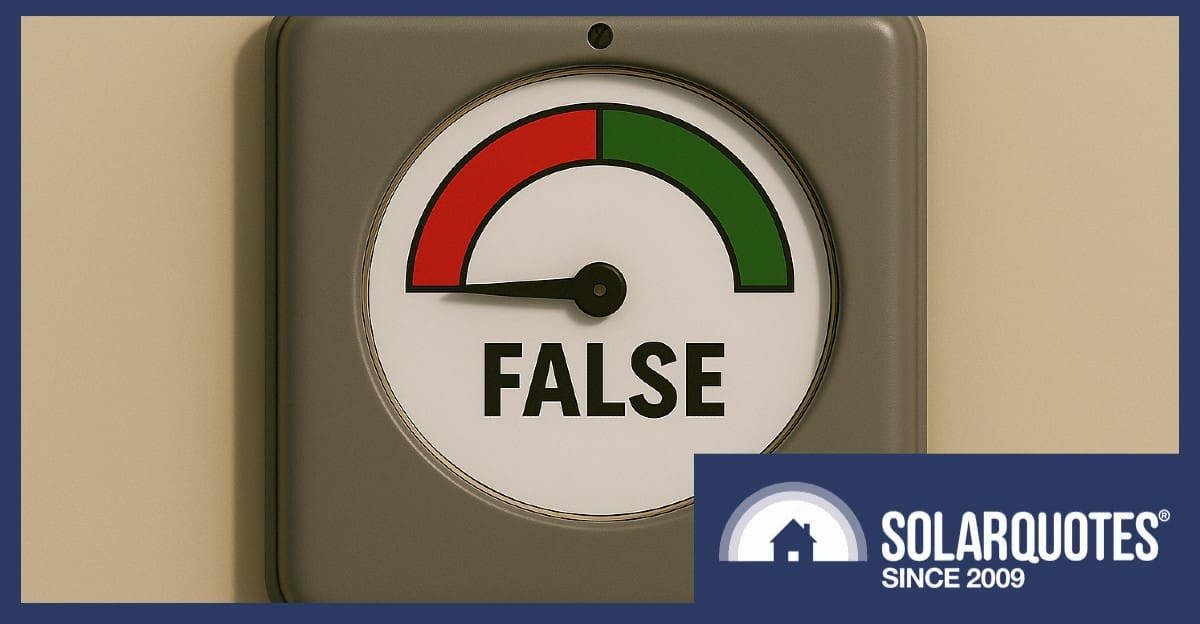
The “Australians for Natural Gas” group has today been reported to the Australian Competition and Consumer Commission (ACCC) for allegedly misleading claims. I’ve looked into this group and found it is spreading a number of false messages on social media, including that gas is an “efficient” source of power and that Australians would struggle to feed themselves or heat their homes without it.
On April 17 the “Australians for Natural Gas” group posted on social media that “many tradies install and use gas because it is an “efficient and effective source of power.”
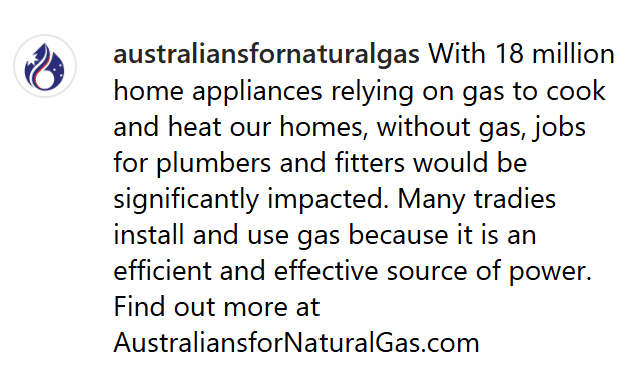
Yeah… that’s not why they do it.
These gas guys are clearly suggesting giving up gas will cause unemployment, but getting off it will involve a massive amount of work for tradies. Eventually, there’ll be no more gas jobs, but there’ll always be work for tradespeople — or at least until you can buy a tradie-bot at Bunnings.
The group also recently claimed that “without gas, Australian homes would struggle to heat and feed themselves”:
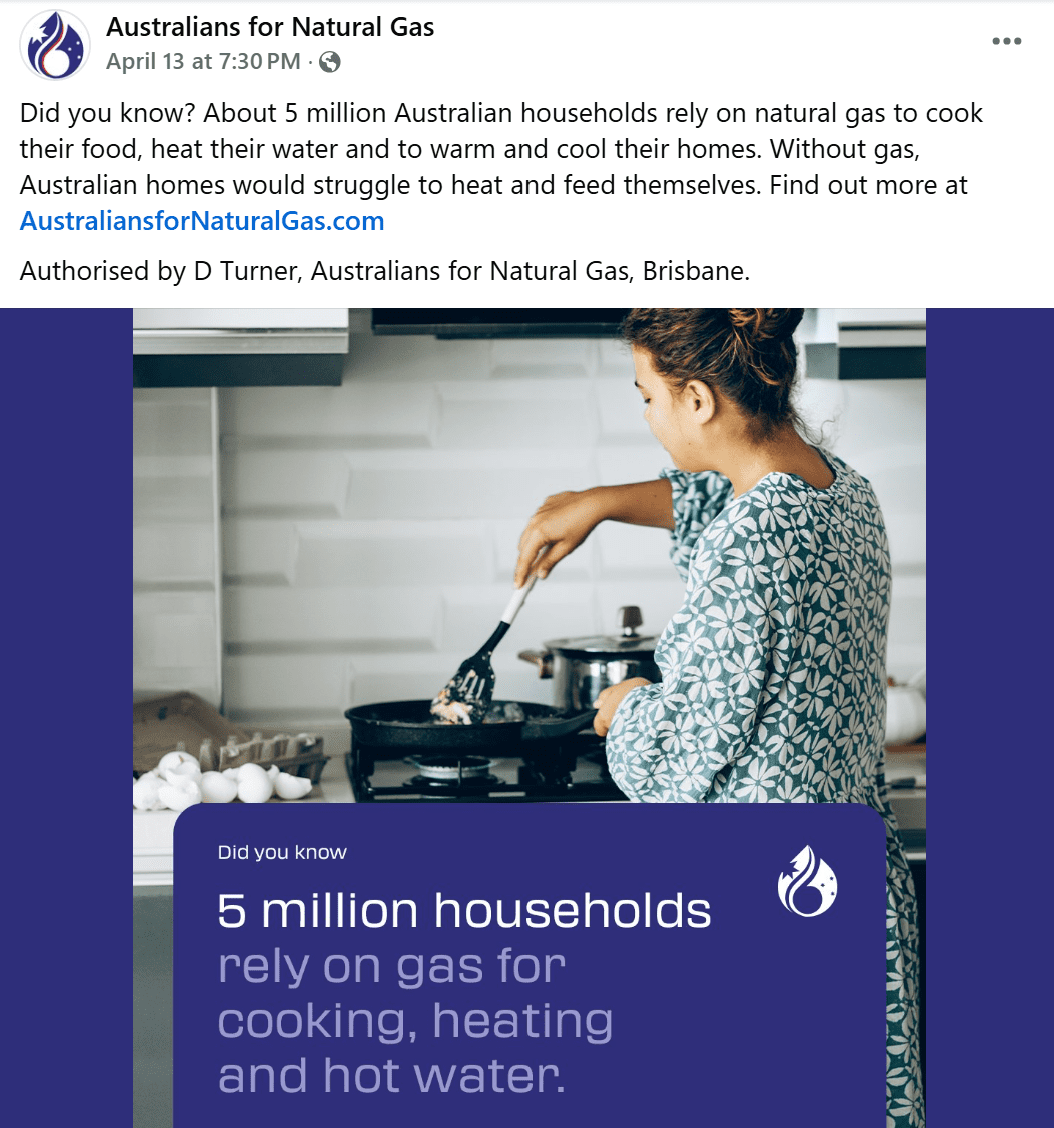

Apparently, there is literally no other way for Australians to cook food, heat water, or warm their homes.
The group has also suggested on social media that “if we turn off the gas, energy bills will skyrocket“, and that turning off the gas leads to “higher prices“.
My Verdict: False
As I’ll show below, electric appliances are way more efficient when it comes to making your home warm and your water and food hot. This directly results in lower energy bills — especially for solar households and super especially for solar and battery ones.
Currently available electric appliances are around two and a half to five times more efficient than their gas counterparts.
Of course, if we immediately shut down the gas supply it would cause a lot of people hardship. But that’s not going to happen. Anyone suggesting it is either bonkers or trying to manipulate you. Getting everyone off gas will take years.
But taking steps to go all electric, whether done at a personal or national level, won’t leave anyone anyone sitting in a cold home after a freezing shower, while sucking on a frozen lasange. (Unless their personal level decisions were really stupid.)
Who Are ‘Australians For Natural Gas’?
Much like the “Mums For Nuclear” group I fact-checked last week, “Australians For Natural Gas” are an astroturfed group backed by lobbyists, attempting to appear as a grassroots community effort. The group was set up by the CEO of gas company Tamboran Resources and is being boosted by the Coalition’s internal pollster Freshwater Strategy. A director of the group has been called up as a Liberal candidate in Whitlam after the party had to dump its initial pick for the seat.
Non-for-profit group Climate Integrity today reported Australians for Natural Gas to the ACCC, asking it be investigated for engaging in misleading or deceptive conduct. The complaint alleges the website and advertising materials of the lobby group failed to disclose its links to the gas industry and Liberals, overinflated the role of gas in the economy and claimed gas would reduce energy bills without disclosing renewables are cheaper.
So, let’s compare how efficient gas is in comparison to its electric counterparts, and show what impact getting off gas has on bills:
Gas MJ & Gas KWh
Gas is usually sold by the megajoule (MJ) and burning 3.6MJ of it releases 1 kilowatt-hour (kWh) of thermal energy. This is how much heat energy is produced when an electrical resistance heating element uses 1kWh of electricity. These are found in electric kettles, space heaters, and conventional electric hot water systems. I’ll compare how efficient gas is at supplying 1kWh of end-use compared to electricity.
Gas Vs. Electric Heating Element Efficiency
The reason gas is usually less efficient than the most basic type of electrical heating is because fire needs to breathe. And if you want to keep breathing yourself, you won’t try to stop that because gas flames that receive inadequate oxygen produce carbon monoxide, and that stuff will kill you dead. Although it does have the advantage that it will first make you so stupid you won’t care.
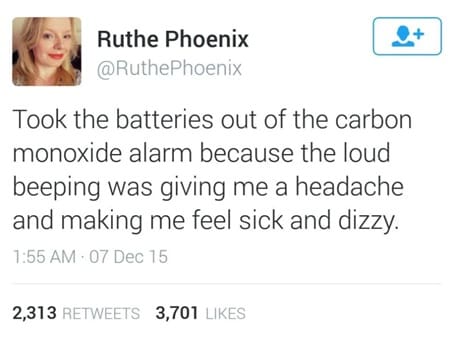

The good news is this turned out to be a joke and she ain’t dead.
Below are estimates of the efficiency of various gas appliances in relation to an appliance that uses an electrical resistance heating element to do the same job.
Gas Room Heaters: 84%. Gas heaters have a flue to stop them asphyxiating you. Because a flue lets fresh air in and polluted air out, heat is lost with the exhaust. This makes a typical household gas heater only around 84% efficient at providing the heat generated to the room it’s in. This means around 4.3MJ of gas or 1.2kWh are required to supply as much heat as 1kWh of electrical resistance heating. If you have an unflued gas heater, don’t use it.
Instant Gas Hot Water: 108%. Gas hot water heaters are about as efficient as room heaters — around 84%. But an instant gas hot water system has an advantage because it doesn’t have a storage tank that gradually loses heat. In an electric hot water system, 25% or more of energy used to heat water can be lost this way. This gives instant gas hot water a modest advantage over conventional electric hot water.
Storage Gas Hot Water: 75%. Not only do these have the disadvantage of the gas flame losing heat to the air, but the small size of their storage tanks means they rapidly lose heat, making them worse than conventional electric hot water.
Gas Cooking: 42%. Gas is really inefficient for cooking. This is because most of the heat goes into the air rather than food. The comparison is even worse for induction stoves, with gas only being 36% as efficient. Replacing a gas stove with an induction cooker is a no-brainer. Not only will it use around one-third the energy, it’s much easier to clean, and you’ll have a faster and more efficient cooking experience.
Gas Vs. Heat Pumps
In all but one case, electric resistance heating is more efficient than gas. But the advantages of electricity become extreme if an electric heat pump is used instead. Because these move heat around, they can be over 3 times more efficient than directly creating heat with electricity.
Reverse cycle air conditioning: An air conditioner is a type of heat pump and, when used in reverse cycle mode, can warm your home far more efficiently than gas or electric resistance heating. Even air conditioners with only a single star for heating on their energy efficiency labels are probably far more efficient than you think. Here’s what reverse cycle energy stars mean:
- One star: 2.5 to 3 times more efficient than electric resistance heating
- Two stars: 3 to 4.5 times more efficient than electric resistance heating
- Three stars: 4.5 to 5 times more efficient than electric resistance heating
So if your air conditioner’s energy efficiency label only has 2 stars for reverse cycle heating and is in the exact middle of its efficiency range, it will still provide 3.75 times as much heat per kWh of electricity than electric resistance heating and 4.5 times as much home heating per kWh of gas. This means gas heating is only around 22% as efficient as a typical air conditioner.
Heat pump hot water: Heat pump hot water systems only use around 30% as much energy as conventional electric hot water. This makes them about 3 times as efficient as instant gas hot water and more than 4 times as efficient as gas storage hot water. They’re less efficient than most reverse cycle air conditioners because the temperature difference they need to create is larger.
Gas Vs. Induction Cookers
While induction stoves aren’t heat pumps, they still have an efficiency advantage over conventional electric stoves — and a huge one over gas. Here’s the result of one study on their efficiency at heating food:
- Gas burner: ~31%
- Conventional electric stove: ~74%
- Induction electric stove: ~86%
This makes a normal electric stove around 2.4 times as efficient as gas and an induction cooker is around 2.8 times as efficient. Induction stoves also have the advantage of being great to cook with, so even ignoring energy savings, they’re a good idea.
Gas Appliances Vs. Grid Electricity Appliances
Below are Australia’s gassy capitals, along with the price of a thermal kWh of gas on a lower-cost plan. Next to it is the cost of a kWh of grid electricity that’s also from a lower cost plan. The electricity price is for a flat tariff. Many homes now have time-of-use tariffs, but because they make comparisons difficult, I’ll stick with flat tariffs. Below that, I’ve put how much they will pay for 1kWh of end-use heat from gas and from electricity. End-use heat is after any losses or efficiency benefits are accounted for. The appliances being compared are:
- Gas instant hot water vs. typical heat pump hot water
- Gas home heating gas vs. reverse cycle air conditioning with 2 energy stars in the middle of its efficiency range.
- Gas stove vs. induction stove
| Gas | Electric | |
|---|---|---|
| Home Heating | Gas 24c | Reverse Cycle 9.6c |
| Hot Water | Instant Gas 18.7c | Heat Pump 10.8c |
| Cooking | Gas 65.2c | Induction Cooker 41.9c |
| Gas | Electric | |
|---|---|---|
| Home Heating | Gas 26.7c | Reverse Cycle 8.8c |
| Hot Water | Instant Gas 20.7c | Heat Pump 9.9c |
| Cooking | Gas 72.2c | Induction Cooker 38.4c |
| Gas | Electric | |
|---|---|---|
| Home Heating | Gas 22.9c | Reverse Cycle 6.4c |
| Hot Water | Instant Gas 17.8c | Heat Pump 7.2c |
| Cooking | Gas 61.9c | Induction Cooker 27.9c |
| Gas | Electric | |
|---|---|---|
| Home Heating | Gas 13.9c | Reverse Cycle 6.4c |
| Hot Water | Instant Gas 10.8c | Heat Pump 7.2c |
| Cooking | Gas 37.7c | Induction Cooker 27.9c |
| Gas | Electric | |
|---|---|---|
| Home Heating | Gas 12.7c | Reverse Cycle 8.4c |
| Hot Water | Instant Gas 9.9c | Heat Pump 9.5c |
| Cooking | Gas 34.5c | Induction Cooker 36.7c |
| Gas | Electric | |
|---|---|---|
| Home Heating | Gas 19.6c | Reverse Cycle 8.8c |
| Hot Water | Instant Gas 15.3c | Heat Pump 9.9c |
| Cooking | Gas 53.2c | Induction Cooker 38.3c |
As the above figures show, electric methods of heating homes, water, and food are cheaper than gas in all the capitals — except for cooking in Perth, where gas is just a little cheaper thanks to having the lowest gas prices in Australia. But the savings on cooking are likely to be under $5 a year for a typical household and are easily wiped out by savings on home heating, hot water, or from not having to pay gas supply charges.
Gas Appliances Vs. Grid & Solar Electricity Appliances
Below I’ve listed the gassy capitals again, and in addition to gas and electricity prices per kWh, I’ve also included a solar feed-in tariff. This feed-in tariff is at the high end of what’s available. If your feed-in tariff is lower you’ll save even more from using electricity rather than gas. Using the following assumptions for electrical appliances…
- Home heating: 25% solar-powered reverse cycle air conditioner (2 energy stars in the middle of its efficiency range.)
- Hot water: 80% solar-powered heat pump hot water
- Cooking: 20% solar-powered induction stove
…I’ll compare the cost of 1kWh of end-use heating from gas and from electricity.
| Gas | Electric | |
|---|---|---|
| Home Heating | Gas 24c | Reverse Cycle 7.7c |
| Hot Water | Instant Gas 18.7c | Heat Pump 4.1c |
| Cooking | Gas 65.2c | Induction Cooker 35.3c |
| Gas | Electric | |
|---|---|---|
| Home Heating | Gas 26.7c | Reverse Cycle 7.1c |
| Hot Water | Instant Gas 20.7c | Heat Pump 3.9c |
| Cooking | Gas 72.3c | Induction Cooker 32.6c |
| Gas | Electric | |
|---|---|---|
| Home Heating | Gas 22.8c | Reverse Cycle 5.4c |
| Hot Water | Instant Gas 17.8c | Heat Pump 3.6c |
| Cooking | Gas 61.9c | Induction Cooker 24.4c |
| Gas | Electric | |
|---|---|---|
| Home Heating | Gas 13.9c | Reverse Cycle 5.1c |
| Hot Water | Instant Gas 10.8c | Heat Pump 2.6c |
| Cooking | Gas 37.7c | Induction Cooker 23.5c |
| Gas | Electric | |
|---|---|---|
| Home Heating | Gas 12.7c | Reverse Cycle 6.5c |
| Hot Water | Instant Gas 9.9c | Heat Pump 2.4c |
| Cooking | Gas 34.5c | Induction Cooker 29.9c |
| Gas | Electric | |
|---|---|---|
| Home Heating | Gas 19.6c | Reverse Cycle 7.1c |
| Hot Water | Instant Gas 15.3c | Heat Pump 3.9c |
| Cooking | Gas 53.2c | Induction Cooker 32.6c |
When solar energy is included, electric appliances beat gas on energy costs everywhere — including cooking in Perth. If you also have a battery then the savings will be even greater, as you can use low cost solar energy at night.
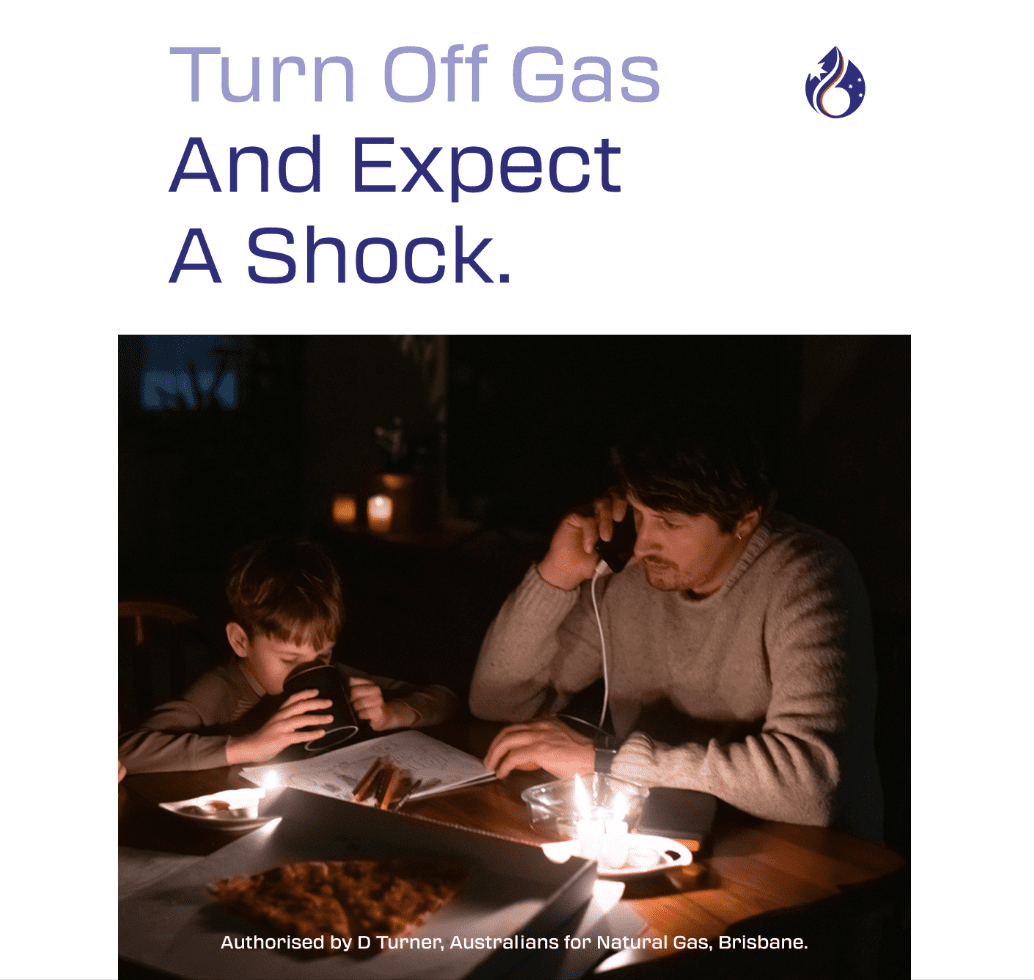

Was this guy the only person in the 21st century with gas lighting? Or did someone cut off supply to the gas generation that provided 6.9% of Brisbane’s electricity over the past 12 months? Because that’s something that’s not going to happen.
Gas Is Not More Efficient Than Electric
So there you have it: in every instance electric appliances can be far more efficient than gas ones. This makes them cheaper to use, with the only exception being cooking in WA using a gas connection with no contribution from rooftop solar.
For more on the money you can save from getting off gas, including the benefits of not having to pay a connection fee, read my comprehensive guide on just how much you can save. If you want to learn how to disconnect from gas without being hit by huge fees, I have an explainer on that as well.






